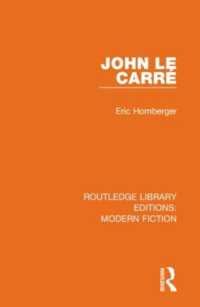基本説明
Leading scholars examine languages ranging from old Egyptian to modern Afrikaans. They consider the insights parametric theory offers to understanding the dynamics of language change and test new hypotheses against an extensive array of data. In both broad range of languages it discusses and it use of linguistic theory this is an outstanding book.
Full Description
This book focuses on some of the most important issues in historical syntax. In a series of close examinations of languages from old Egyptian to modern Afrikaans, leading scholars present new work on Afro-Asiatic, Latin and Romance, Germanic, Albanian, Celtic, Indo-Iranian, and Japanese. The book revolves around the linked themes of parametric theory and the dynamics of language change. The former is a key element in the search for explanatory adequacy in historical syntax: if the notion of imperfect learning, for example, explains a large element of grammatical change, it is vital to understand how parameters are set in language acquisition and how they might have been set differently in previous generations. The authors test particular hypotheses against data from different times and places with the aim of understanding the relationship between language variation and the dynamics of change. Is it possible, for example, to reconcile the unidirectionality of change predominantly expressed in the phenomenon of "grammaticalization", with the multidirectionality predicted by generativist approaches? In terms of the richness of the data it examines, the broad range of languages it discusses, and the use it makes of linguistic theory this is an outstanding book, not least in the contribution it makes to the understanding of language change.
Contents
1. Parameter Theory and Dynamics of Change ; 2. parameters in Old Romance Word order: A comparative minimalist analysis ; 3. Micro-parameters in the Verbal Complex: Middle High German and some modern varieties ; 4. Language Acquisition in German and Phrase Structure Change in Yiddish ; 5. Extraposition of Restrictive Relative Clauses in the History of Portuguese ; 6. Doubling-que Embedded Constructions in Old Portuguese: A diachronic perspective ; 7. Brazilian Portuguese and Caribbean Spanish: Similar changes in Romania Nova ; 8. macroparametric Change and the Synthetic-analytic Dimension: The case of Ancient Egyptian ; 9. A Diachronic Shift in the Expression of Person ; 10. The Formal Syntax of Alignment Change ; 11. The Diachronic Development of the Irish Comparative Particle ; 12. Deictic Locatives, Emphasis, and Metalinguistic Negation ; 13. Negative Changes: Three factors and the diachrony of Afrikaans negation ; 14. Romanian 'Can': Change in parametric settings ; 15. Prepositional Genitives in Romance and the Issue of parallel Development: From Latin to Old French ; 16. Parameter Theory, Historical Convergences, and the implicational Structure of UG ; 17. Macroparameters and Minimalism: A programme for comparative research ; References ; Index








